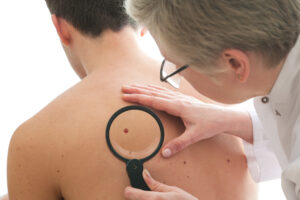
The Food and Drug Administration (FDA) has authorized the first artificial intelligence-powered medical device to help doctors detect the most common forms of skin cancer in patients.
The technology, from Miami-based medical device maker DermaSensor, is used to further evaluate lesions that doctors have already flagged as suspicious and is not meant to be used as a screening tool, according to the FDA.
More specifically, the non-invasive, handheld device uses AI-powered spectroscopy tech to assess cellular and below-the-skin’s-surface characteristics of lesions on patients. The device, also called DermaSensor, provides real-time results based on an AI algorithm that is trained on data related to more than 4,000 malignant and benign lesions, according to the company. It then delivers a “spectral similarity score” to known cases in order to complement a physician’s own assessment of a mole or lesion.
How does it work?
According to the company:
1. A doctor identifies a potentially cancerous lesion on a patient.
2. The wireless device is pressed against the lesion to record it.
3. DermaSensor scans the lesion.
4. A proprietary algorithm analyzes spectral data and delivers an assessment in real-time.
5. An “Investigate Further” result suggests a specialist should examine the lesion.
6. A “Monitor” result suggests no further evaluation is immediately necessary.
Learn more about the device here.
